1. Ignoring Quiet Hours
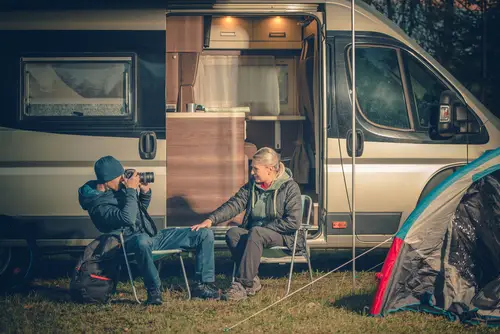
Campgrounds usually have designated quiet hours—often from 10 p.m. to 6 a.m.—to give everyone a chance to rest. But some RV travelers keep the music blasting, run noisy generators, or carry on loud conversations late into the night. It might seem harmless in the moment, especially if you’re having fun, but it quickly turns neighbors into complainers. Repeated violations can and do get people kicked out.
If you’re not paying attention to campground rules or signs, it’s easy to cross the line. Hosts take quiet hours seriously because they’re tied to guest satisfaction. They’re not trying to kill your vibe—they’re trying to keep the peace. So if you’re treating the campground like your backyard party spot, don’t be surprised if you’re shown the exit.
2. Dumping Tanks Improperly
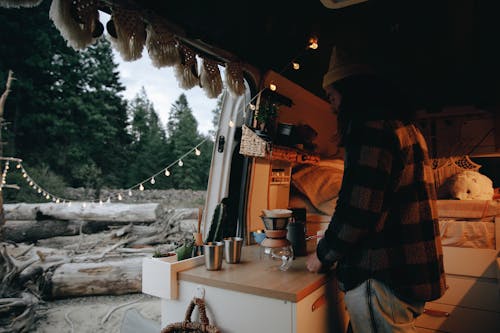
This one’s a biggie—and it’s both gross and dangerous. Some RVers still dump gray or black tanks in unauthorized areas or fail to use proper hookups. Even when it’s accidental, it can lead to contamination, bad smells, and expensive cleanup. Campgrounds are quick to ban offenders because the consequences affect everyone around.
There are clear rules for a reason, and many campgrounds have cameras or attentive staff watching for misuse. Dump stations and sewer hookups are there for your convenience—use them right. Even a slow leak from a poorly sealed hose can lead to complaints. Just because you’re out of sight doesn’t mean you’re off the hook.
3. Leaving Trash or Food Out
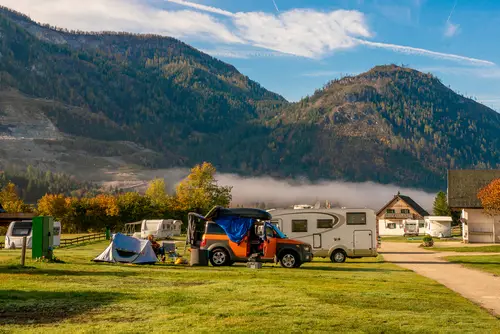
Leaving garbage or food out overnight is an open invitation to wildlife—and trouble. Bears, raccoons, skunks, and even squirrels can wreak havoc once they know there’s an easy meal around. Worse, it endangers both animals and people and often leads to permanent campground closures or restrictions. That’s why rangers and hosts come down hard on repeat offenders.
It’s not just about cleanliness—it’s about safety and responsibility. Coolers, grills, and dog bowls should all be stowed properly. If you can’t keep your site tidy, you’re putting others at risk, and that’s a fast track to being uninvited. And yes, some campgrounds do keep a list.
4. Not Controlling Pets

Campgrounds are generally pet-friendly, but they expect you to keep control of your animals. Letting dogs roam off-leash, bark constantly, or bother other campers is a huge issue. It’s not just annoying—it can escalate to injuries or property damage. That’s why some RVers find themselves banned even after one bad stay.
Every campground has pet policies, and ignoring them can get you booted. Leashes, poop bags, and good training go a long way. Hosts don’t want to play dog catcher or mediate pet disputes. If your furry friend can’t behave, you’re both at risk of being shown the door.
5. Taking Over More Than One Site

Some RV travelers get a little too comfortable and spread out beyond their reserved space. That might mean parking extra vehicles, putting chairs or rugs on the next site, or using hookups from a neighboring lot. Even if the site is empty, that doesn’t mean it’s fair game. This kind of behavior frustrates staff and other campers alike.
It’s about respecting shared space and the rules that make camping fair for everyone. When people feel like others are taking more than their share, complaints pile up quickly. Hosts often have little patience for “site sprawl.” Don’t be surprised if it results in a warning—or a ban.
6. Sneaking in Extra Guests
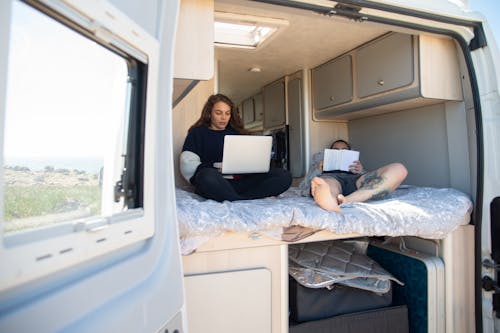
Bringing along unregistered guests might not seem like a big deal, but it throws off the campground’s safety protocols and resources. Extra people mean more pressure on water, waste, and parking—especially if they’re using the showers or pool. Some folks try to avoid extra fees, but this shortcut can backfire. If caught, you might be asked to leave on the spot.
Campground managers keep headcounts for a reason, especially in fire-prone or remote areas. It’s also about accountability—who’s on the property in case of emergency. Trying to fly under the radar breaks that trust. If you’re not upfront about who’s staying, you could lose your camping privileges.
7. Disregarding Generator Rules

Generators are lifesavers when you’re off-grid, but they can be a nightmare for your neighbors if you’re not careful. Many campgrounds only allow generator use during certain hours, and some prohibit them altogether. Running one early in the morning or late at night is a major faux pas. It’s one of the most common causes of noise complaints.
Even during permitted hours, excessively loud or poorly maintained generators create friction. Some campers assume it’s their right to use it whenever—but that’s not how shared spaces work. If you’re in a campground with hookups, there’s usually no need for one anyway. Persistent misuse can get you blacklisted.
8. Cutting Through Other People’s Campsites

It might seem like a harmless shortcut, especially when you’re just walking to the restroom or the beach. But crossing through someone else’s site is considered a big no-no in campground etiquette. It’s like walking through a stranger’s backyard—awkward at best, creepy at worst. And yes, people absolutely complain about it.
Repeated trespassing, even on foot, can make others feel unsafe or disrespected. It’s not your land, even if it’s just a temporary setup. Taking the long way around shows respect for your fellow campers. Don’t be that person who gets remembered—and banned—for poor manners.
9. Flying Under-the-Radar Campfires
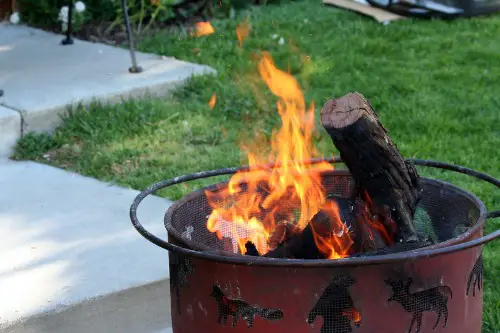
Campfire rules are serious business, especially in areas prone to wildfires. Some RVers still light fires during bans or in places without proper pits, thinking they’ll go unnoticed. But campgrounds monitor this closely, and breaking fire rules is one of the fastest ways to get ejected. It’s not worth risking the entire forest for s’mores.
Even when fires are allowed, leaving them unattended is a major problem. Embers can travel farther than you think, and high winds change everything fast. Responsible fire practices aren’t optional—they’re required. If you ignore this, you won’t just get banned; you might get fined too.
10. Ignoring Check-Out Times

Check-out times exist for a reason—to give staff time to clean and prep sites for incoming campers. But some RV travelers linger long past the posted hour, blocking access and causing delays. It’s especially frustrating in tight campgrounds where one site affects the flow of many. Late departures without permission are viewed as disrespectful.
Some campers assume a little extra time won’t hurt, but it quickly snowballs. Campgrounds operate on tight schedules, and late check-outs mess with everyone’s plans. Hosts might let it slide once, but chronic offenders get flagged. Don’t be surprised if you’re not welcomed back.
11. Smoking in Non-Smoking Areas
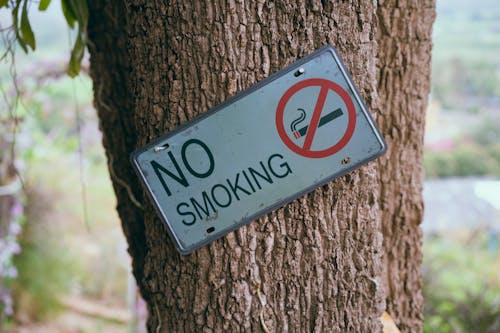
More and more campgrounds are enforcing no-smoking zones, especially in communal areas or places with fire risk. But not everyone takes the rules seriously. Whether it’s cigarettes, cigars, or cannabis, the smoke drifts and disturbs others. Even outdoor settings aren’t always free-for-alls.
It’s about health, comfort, and safety—especially for families with kids or allergies. Violating smoking rules is a quick way to rack up complaints. If the campground has clear signage, you’re expected to follow it. Persistent disregard can lead to a permanent ban.
12. Letting Lights Stay on All Night

Bright exterior lights might make you feel secure, but they can ruin the camping experience for those around you. Some RVers leave their floodlights, porch lights, or underglow on all night long. This makes it hard for neighbors to sleep and kills the natural vibe. It’s light pollution—and campers hate it.
A little courtesy goes a long way here. Use motion lights or dim settings if you need to see at night. If you’re in a dark-sky park or a nature-heavy area, lights are especially frowned upon. Keep it dark and quiet—just like nature intended.
13. Speeding Through the Campground

Campgrounds are full of kids, pets, and pedestrians—and the speed limits (usually 5–10 mph) exist to protect them. But some RV drivers or tow vehicles tear through like they’re late for a meeting. It might not feel fast, but heavy vehicles take longer to stop and cause more damage. Speeding is taken seriously, and offenders are often reported.
Hosts are quick to warn speed demons—and quick to remove repeat offenders. It’s not just a rule; it’s a safety issue. Even one close call is enough to get banned. Slow down and enjoy the ride—it’s part of the experience.
14. Acting Like the Campground Is a Free-for-All
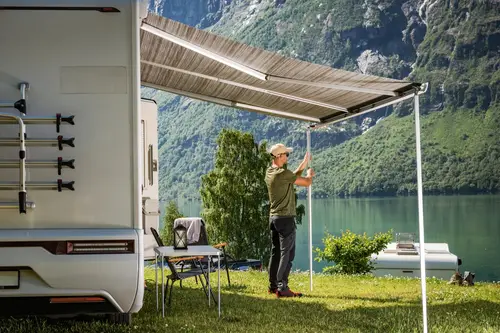
This one’s less about a single offense and more about an attitude. Some RVers show up thinking rules don’t apply to them—they blast music, spread out like they own the place, and disregard any sense of community. That kind of behavior gets noticed fast, especially in smaller or privately run parks. And once you’re labeled “that camper,” your chances of returning are slim.
Campgrounds are communities, even if it’s just for a weekend. Respect for others, for nature, and for the space is key. If you’re treating the campground like your personal party zone or dump station, don’t be shocked when you’re turned away next time. It’s not about being strict—it’s about keeping things enjoyable for everyone.
15. Washing RVs or Vehicles on Site
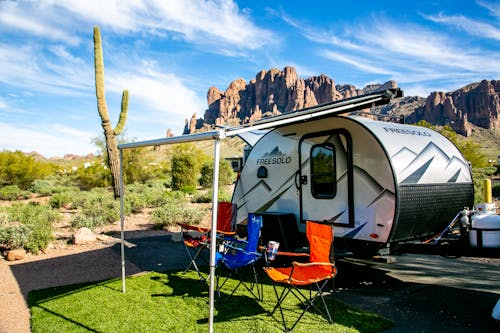
Some campers treat their stay as a perfect time to give their RV or tow vehicle a full scrub. While it might feel productive, most campgrounds prohibit washing because it wastes water and creates runoff problems. Soap, dirt, and grease can flow into sensitive areas and harm the environment. It’s also disruptive for neighbors who didn’t come to watch a detailing session.
If you really need to wash your rig, most parks expect you to use designated wash bays or find a local car wash. Ignoring this rule can quickly put you on a manager’s radar. Water restrictions are common in many regions, and breaking them is taken seriously. Even a “quick rinse” can lead to a warning—or worse, a ban.
16. Reserving Spots You’re Not Using
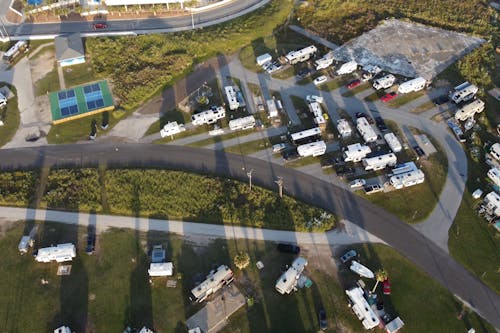
Some RVers book multiple sites to ensure privacy or hold spaces for friends who might join later. While it might seem harmless, it takes valuable spots away from other travelers and can cause resentment. Campgrounds work hard to maximize occupancy, and empty reserved sites are a sore subject. Staff notice when sites are booked but sit unused.
If you’re tempted to overbook, consider that some parks have rules specifically against it. In busy seasons, this kind of behavior can lead to canceled reservations or refusal of future bookings. Sharing the space fairly keeps everyone happier. Hogging sites just for personal comfort can get you flagged as inconsiderate.
17. Improperly Disposing of Cigarette Butts

Even in designated smoking areas, flicking cigarette butts on the ground is a major campground offense. Not only is it litter, but it’s also a fire hazard—especially in dry, wooded regions. Staff often spend hours picking up after careless smokers, which fuels strict enforcement. It’s one of those small actions that creates big frustration.
Campgrounds expect smokers to use proper receptacles, and failing to do so shows disregard for the environment. A single smoldering butt can spark a wildfire in the wrong conditions. Offenders quickly gain a bad reputation among both staff and guests. If you smoke, clean up completely—or risk losing your camping privileges.
18. Using Non-Biodegradable Products Outdoors
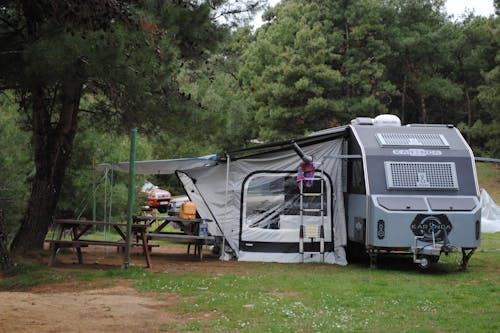
Washing dishes, gear, or even yourself outside with regular soap can harm plants, pollute waterways, and upset the delicate balance of campground ecosystems. Some RVers still do it, assuming a little soap in the grass won’t matter. But over time, those chemicals add up. Campgrounds that catch guests doing this often respond with fines or eviction.
Biodegradable soap is a must if you plan to wash outside—and even then, it should be used sparingly and away from streams or drains. Many parks provide dishwashing stations to avoid contamination issues. Skipping these rules is seen as disrespectful to both nature and the community. If you want to stay welcome, stick to eco-friendly habits.
19. Hogging Shared Amenities
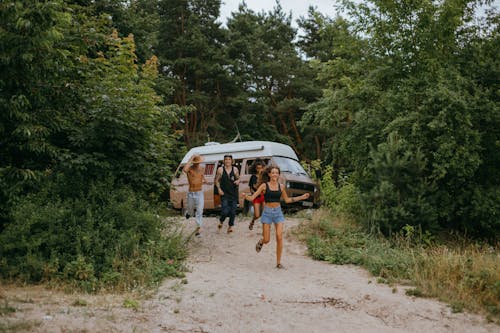
From laundry rooms to picnic pavilions, campgrounds have shared amenities meant for everyone. But some campers monopolize them—loading every washer with multiple loads or claiming a covered area for hours. This creates friction, especially in smaller campgrounds with limited facilities. Staff often hear about it from frustrated guests.
If you need to use a shared space for an extended time, be considerate and check if others are waiting. Rotating fairly keeps the peace and avoids unnecessary complaints. Those who continually hog resources risk being labeled inconsiderate. Once you get that reputation, it’s hard to shake—and easy to get banned.
20. Draining Coolant or Oil on the Ground
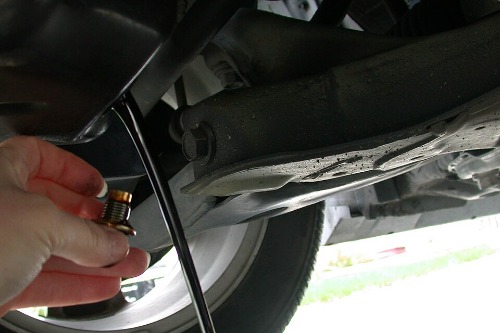
Performing major vehicle maintenance at your site is usually against campground rules, and for good reason. Leaking fluids like oil, coolant, or transmission fluid can contaminate soil and water, creating lasting environmental damage. Some RVers still attempt repairs without proper containment, leaving messy, toxic stains behind. This is a surefire way to get kicked out.
If you have a breakdown, campgrounds expect you to use a professional mechanic or a safe offsite location for repairs. Attempting it in your spot shows disregard for both the rules and the environment. Cleanup can be costly, and many parks will bill you directly. It’s simply not worth the risk to your wallet—or your welcome.
21. Feeding Wildlife

Tossing scraps to a friendly squirrel or raccoon might seem harmless, but it causes long-term problems. Animals fed by humans lose their natural fear, become dependent, and can turn aggressive. Campgrounds see this as a major safety issue for both guests and wildlife. In some areas, it can even violate state or federal laws.
If you enjoy seeing animals up close, observe from a distance without altering their behavior. Feeding them not only risks your own safety but also encourages them to harass other campers. Once animals start associating people with food, they often have to be relocated—or euthanized. No scenic encounter is worth that outcome.
This post 21 RV Travel Habits That Are Quietly Getting People Banned from Campgrounds was first published on Greenhouse Black.
